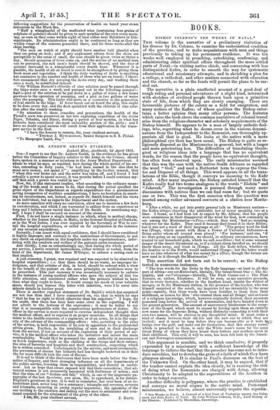DR. ANDREW SMITH'S EVIDENCE.
Lesketh How, Ambleside, 2d April 1855. Sin—I regret to see that Dr. Andrew Smith, in the evidence he has given before the Committee of Inquiry relative to the Army in the Crimea, should have spoken in a manner so injurious to the Army Medical Department. I allude to what he says, as reported, how during the whole period of his ser- vice, extending to forty years, "he had been nursed in the idea that he must save money, not spend it" ; amplifying by the further remark, that "when this war broke out and the screw was taken off and I found I had actually a power to spend money, it was months before L could convince my- self that such a power was vested in me."
Now, Sir, if this statement implies, what according to the ordinary mean- ing of the words used it seems to do, that during the period specified the great object of the Department as regards expenditure was a parsimonious saving irrespective of worthier considerations, I have no hesitation in assert- ing its incorrectness, not, indeed, as regards Dr. Smith himself and his views as an individual, but as regards the Department and the system.
As mere assertion will carry no conviction, allow me to mention a few facts in corroboration, and which I am warranted to adduce from an experience as long and I believe more varied that that of Dr. Smith. In mentioning myr self, I hope I shall be excused on account of the occasion.
First, I do not know a single instance in which, when in medical charge, whether in the Ionian Islands, in Malta, in the General Hospital at Chatham, or in the West Indies, I was ever required by the Secretary at War to cur- tail the hospital expenditure, or called on for explanation in the instance of any unusual expenditure. Secondly, I can assert with equal confidence, that I should have considered it highly improper, and contrary to the instructions of Government, to put any check on expenditure in the hospitals under my superintendence, inter- fering with the comforts and welfare of the patients under treatment. And thirdly, I can as unhesitatingly say,. that during the whole period of my service, I never received instructions, either written or verbal, from the head of the department, Sir James M'Grigor, to enforce a saving such as that implied.
A just economy, I grant, was required and was expected to be observed in hospital expenditure ; t. e. that there should be no waste, no improper in- dulgence, and that articles of diet, in brief, should be ordered with a view to the benefit of the patient on the same principles as medicines were to be prescribed. This just economy it was occasionally necessary to enforce in the instance of young medical officers who gave the subject of diet too little attention, and considered rather what the patients wished to have than what they ought to have. It would occupy too much of your valuable space, should you honour this letter with insertion, were I to enter into minute details in further proof. There is another reported statement of Dr. Smith's which has surprised me not less than that I have commented on, viz. that in which he says "that be has no right to think otherwise than his superiors." I hope, for his credit, that there has been here some error in the reporting. I will not advert to the lowness of the expression ; it may be better to say that it is incompatible with the conscientious performance of duties. No officer in the service is more required to exercise independent thought than the medical officer, and to express it on proper occasions. In all things that relate to the health-concerns of a regiment, or of an army, be is in the capa- city of the adviser of the commanding officer; who, according to the rules of the service, is held responsible if he acts in opposition to the professional advice Liven. Further, in the invaliding of men and in their discharge from the service, if not on account of the expiration of their period of ser- vice, it is the medical officer who takes the initiative and incurs the main responsibility. Would that he possessed the same authority in measures of as much importance, such as the clothing of the troops and their rations, the sites of barracks and hospitals and their construction, respecting _which he is seldom consulted. Unfortunately for the service, and most erroneously, the prevention of disease has hitherto had less thought bestowed on it than the far more difficult task the cure of disease. It is sad to think of the disclosures that have been made before the Com- mittee of Inquiry, and their damaging influence on all the departments of the public service, lowering them in respectability, and thereby in useful- ness. Let us hope that errors exposed will find their correctives; that ad- vanced science is not necessarily associated with feebleness of action ; and that the time of our "decline and fall," which, in one of the impressive pa- ragraphs of the last Spectator, you seem, Sir, to apprehend, is far distant. England'a greatness in war, it is well to remember, has ever been of an in- termittent kind, never long for a constancy ; triumphs and reverses, reverses and triumphs, occurring in pretty regular sequences; the ignominy of the one inciting to the exertion and calling out the men to administer and com- mand required for the attainment of the glory of the other.


























 Previous page
Previous page